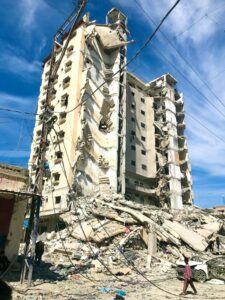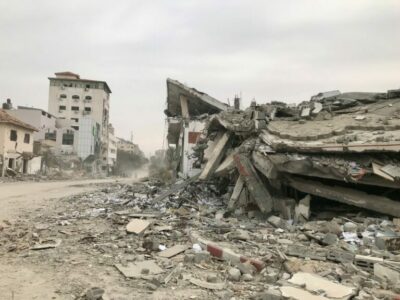Public service announcement for folks out there who are indignant about the fact that “Hamas started this trouble, and now Hamas wants to be rewarded with a state.”
by Kathryn Shihadah, reposted from Patheos
Look, we don’t need an international law to tell us that the right to self-determination belongs to everyone – but just to be on the safe side, it is part of the United Nations charter. All members of the United Nations pledge to uphold this right in the global community.
Therefore, basic collective human rights – self-determination, national independence, territorial integrity, national unity, and sovereignty without outside interference – are essential and universally legitimate. We can all agree to this, right?
Stay with me now.
UN General Assembly resolution A/RES/38/17 (22/11/1983) reaffirms the right to self-determination that the Charter spelled out, adding that “the struggle of peoples for their independence, territorial integrity, national unity and liberation from colonial domination, apartheid, and foreign occupation by all available means, including armed struggle.”
(This is not a law, but a recognition of the views of the majority of UN Member States.)
What’s that you say? You don’t like the idea of “people” taking up arms?
That may be because you already enjoy self-determination. Most of us can’t begin to imagine what it’s like to live under occupation and blockade for a week, let alone our entire lifetime. Palestinians have felt Israel breathing down their necks, controlling every aspect of their lives, every single day. This is not an exaggeration.
At this moment, the people of Gaza are desperate for humanitarian aid right now. Israel has withheld even the most basic items from them – fresh water to drink, fuel to cook with, basic food items to eat.
But humanitarian aid is not the only thing Palestinians need. What they need, what they “took up arms” for, is that basic collective human right: self-determination. They want to be out from under the boot of Israel, which has kept Gaza “on a diet” since 2006, and in a full-blown famine in recent weeks – not to mention the genocide.
(Israel has violated international laws in the occupied West Bank of Palestine too – but that’s a conversation for another day.)
Not just for eight months, but for decades, many in Gaza have been in a daily struggle for basic needs (food, work, travel, safety, etc.) and an existential struggle for justice and freedom.
The October 7th incident and the outcry that followed were not about antisemitism (this fact has been emphasized again and again), but about freedom and self-determination.
Myths and false accusations have grown out of October 7th – many of them started knowingly by the Israeli military to dehumanize Palestinians and delegitimize their struggle. These “fake news” stories have been thoroughly debunked (for example, see this and this and this).
Don’t give in to simplistic conclusions: “Palestinians don’t deserve those rights. First they need to stop being so violent.” No. That is not how human rights work.
Human rights are our birthright. They are not something we must earn, but – at least in theory – an integral part of being alive.
Palestinians’ human rights were stolen from them generations ago. The global community should never have let that happen, but since we did, we should be laboring to make it right.

We haven’t.
Which is why, for years and years, Palestinians have fought to get their rights back – sometimes by means of armed struggle, but largely through peaceful means.
Few in the West are familiar with the Great March of Return in Gaza, an 18-month-long unarmed protest, conducted by tens of thousands of civilians, or the years-long peaceful demonstrations in the West Bank (read this and this and this, for example).
Palestinians seeking redress in the International Criminal Court risk Israeli retribution.
Because the world (including us) has not restored Palestinians’ stolen rights, Palestinians have taken the work upon themselves – “by all available means.”
Palestinians (those in all regions from the river to the sea – Gaza, the West Bank, East Jerusalem, and Israel) struggle against their occupier for basic human rights, including self-determination (defined as a people’s right to form its own political entity).
Nearly half of all Palestinians live in exile/diaspora; many left their occupied homeland as an act of personal self-determination.
Most Palestinians long for statehood, long to get out from under Israeli occupation (in the case of Gaza and the West Bank), or second-class citizenship (in the case of the 20% of Israeli citizens who are Palestinian), or limbo (East Jerusalemites).
Some Palestinians in the diaspora long to go back to their homeland; others simply want to know they have a homeland.
The Palestinian struggle to achieve their basic collective right is a struggle against the entity that is preventing its realization. Obviously, this entity is Israel.
Their enemy is not Jews – Jews haven’t hurt Palestinians or taken away their rights. Israel has – the Zionist project. Palestinians and their allies know this. (Zionism is the ideology that supports a “Jewish state” in the historic land of Palestine, without consideration for the indigenous people of that land). Zionism caused the dispossession, exile, and oppression of the Palestinian people, and Zionism is the enemy. It just so happens that, in that particular region, most Jews are Zionists and most Zionists are Jews.
Many of us assume the violence of October 7th sprang out of nowhere, or out of deep antisemitism or natural savagery (do the words “human animals” ring a bell?). We are viewing the entire issue through a false paradigm (mainstream media and spokespeople for Israel and the Zionist project speak from this profoundly distorted perspective).
That’s why many Americans – and many in the “Global North” – assume the pro-Palestine movement is antisemitic.
The “violence” that we charge Hamas with had its start in the violent birth of Israel in 1948 (and years of violence before that), and the inherent violence of Israel’s ongoing occupation and oppression of the Palestinian people – subsidized in great part by the US, thanks to the Israel lobby (notably, American taxpayers do not share Washington’s “special relationship” with Israel, but the lobby seems to have more influence over our politicians than voters do).
When we take the time to understand the history and ideology of the region (the actual history, not the fictional one, the actual ideology of Zionism, not the sanitized one), the Palestinian struggle begins to make sense.
Go ahead and sit in your discomfort about October 7th – don’t ignore it. It was a horrific event (an unknown but significant number of Israelis were killed by fellow Israelis that day, which is also horrific). As you sit, reflect on 76 years of oppression and dispossession that we have permitted – that we have unwillingly subsidized.
October 7th was not unlike the Warsaw Ghetto Uprising, in which Jews, instead of waiting quietly to die, took up arms against the Nazis. Those Jews perpetrated violence against their jailer and killer, and no one holds that against them.
Warsaw was a prime example of taking up arms in pursuit of human rights.
The situation of Palestinians in Gaza is another prime example. Spend a moment considering this possibility.
Asking the wrong questions:
Many Americans looked at the news on October 7th and beyond, and said, “What did Hamas think would happen when they attacked Israel?”
Those with this reaction may not have been aware that for seventeen years, Gaza has been an open-air prison – with Israel guarding the gates.
But those who know better watched October 7th unfold and said, “Well, that was bound to happen” and “how long did Israel think they could keep oppressing Palestinians before it came back and bit them in the butt?” (That’s precisely what my husband and I said that day.)
Do we think Palestinians spontaneously ran into Israel one day with no plan, only bloodlust? That they didn’t care about the result? Such assumptions say more about us than about them: we simplistically believe they’re unintelligent, brutish; we know nothing of the courage or despair that would cause a group to take on one of the most advanced military powers in the world.
Looking at the war that October 7th spawned, do we conclude that Hamas fighters’ effort was counter-productive – or do we realize that Israel’s response was heinous and excessive?
What did we expect? That Palestinians would allow themselves to be victimized forever?
What did we think would happen when months of peaceful protests became nothing but target practice for Israeli snipers?
What did we think would happen when years of “indiscriminate rockets,” and their message of resistance, were swatted away like so many mosquitoes?
Why should we have a say in how Palestinians resist their oppressor? They don’t need our advice, our armchair lectures. They need Israel to get out of their way. They need justice. They need self-determination. (And yes, they will need us to help rebuild what our weapons have destroyed.)
Do we think Palestinians are powerless and helpless, able only to live on charity from food kitchens and humanitarian aid deliveries? Or is this simply what they’ve been reduced to?
Does anyone deserve to be put in that state, let alone forced to stay there for a lifetime?
If you’re still uncomfortable that the Palestinian leadership in Gaza “chose” to be violent on October 7th, but not that Israel chose to be violent for 27,000 days before that – how about taking some time for reflection?
See whether you can become uncomfortable with Israel’s seventy-six years of violence and ethnic cleansing.
See whether you can begin to mourn the fact that the world allowed something like October 7th to be necessary.
When you can, it’s time to join the work of fighting for Palestinian rights (and the rights of all the marginalized) before another October 7th takes place (because it will).
(This post has been edited since it was originally published.)
 Kathryn Shihadah Shihadah is an editor and staff writer for If Americans Knew. This is reposted from Patheos – Grace Colored Glasses – Kathy’s blog on Patheos, an online destination to engage in the global dialogue about religion and spirituality. She also occasionally blogs at Palestine Home.
Kathryn Shihadah Shihadah is an editor and staff writer for If Americans Knew. This is reposted from Patheos – Grace Colored Glasses – Kathy’s blog on Patheos, an online destination to engage in the global dialogue about religion and spirituality. She also occasionally blogs at Palestine Home.
RELATED ARTICLES:
- A history lesson on the legitimacy of resistance.
- The Destruction, Starvation and Death in Gaza Are Israel’s Defeat.
- Long History of Jewish Dissent Over Israel’s Treatment of Palestinians.
- The Right of Return to Free Palestine.
- What Americans Need to Know about Gaza and Israel Right Now.
- Netanyahu: Concern for Palestinian Rights Is “Crazy”.
- Opinion: Zionism’s Terrorist Heritage.
- Shlomo Sand: How Israel Went From Atheist Zionism to Jewish State.
- The Moral Decadence of Zionism.
- Banning Arab and Anti-occupation Films, This Censorship Agency Shaped Israel for Decades.

